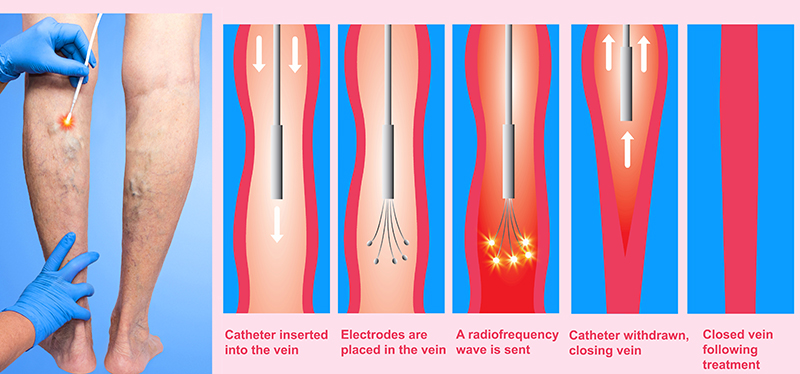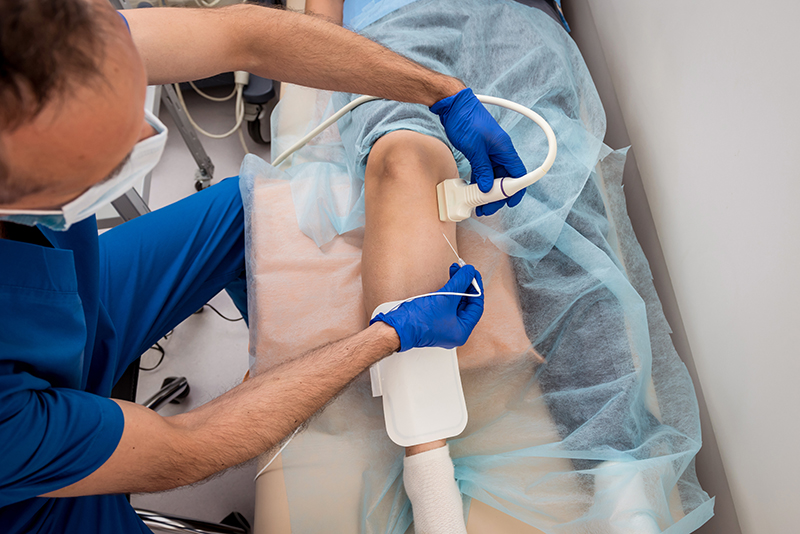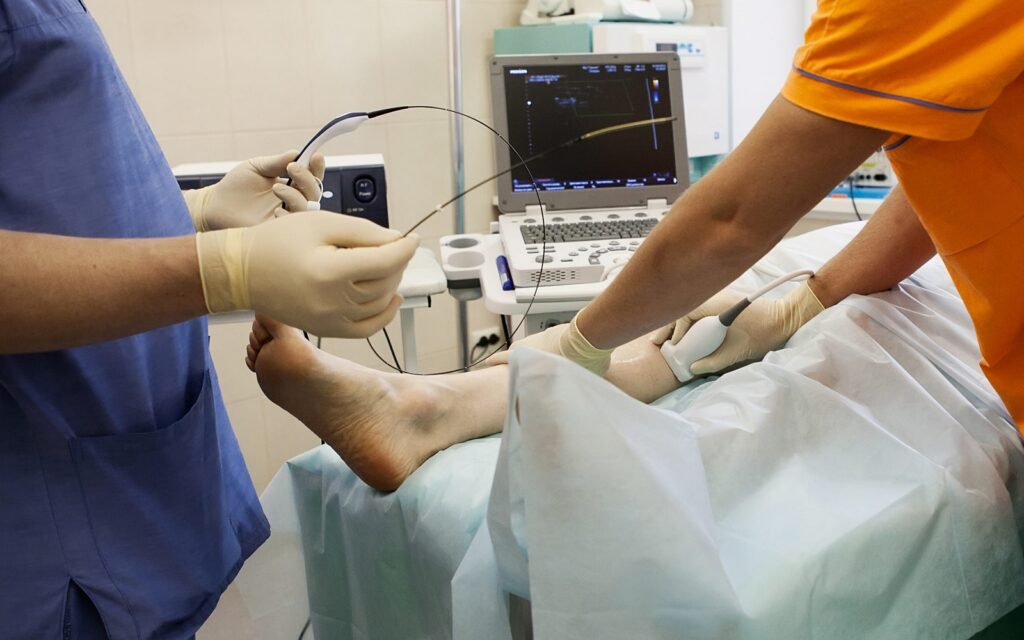17 FAQs Patients Ask About Radiofrequency Ablation (RFA)
Author: StrideCare Internal Team

Studies show there are approximately 25% of men and women suffering from painful varicose veins. The good news is treatment options for varicose veins and vein disease are available that do not require surgery. Doctors these days aren’t so quick to suggest their patients go under the knife, thanks to modern medical advancements in equipment and technology. A consultation with your vein doctor can determine the type, severity, and location of your vein problem. If it’s obvious that you have painful and twisted varicose veins which need treatment, radiofrequency ablation (RFA) may be right for you. It’s also worth noting that even if you experience occasional achiness, throbbing, numbness, and cramping now, these symptoms can get worse and lead to more serious complications if you do not seek treatment.
Questions Patients Commonly Ask About RFA
- What Is Radiofrequency Ablation (RFA)?
Radiofrequency ablation is a minimally invasive treatment that uses radiofrequency (RF) energy to treat varicose vein or chronic venous insufficiency (CVI) patients. One of the expert vein doctors at Hamilton Vascular inserts a catheter into the diseased vein to provide consistent and uniform heat. This contracts collagen in the vein walls, causing them to collapse and close. After the vein is sealed shut, blood then naturally redirects to healthy veins. RFA results in little to no scarring and is generally performed using local anesthesia in the convenience of our Hamilton Vascular offices, so no hospital admittance is required.

- What Is Chronic Venous Insufficiency (CVI)?
CVI is a progressive medical condition in which valves that carry blood from the legs to the heart no longer function, causing blood to pool in the legs and veins to swell. This incorrect blood flow (or reflux) causes veins to expand, lose form and protrude from beneath the skin. Common symptoms include pain, leg swelling, leg heaviness and fatigue as well as skin changes and ulcers in more severe cases. Varicose veins are often thick, bulging veins that can protrude well beyond the skin’s surface. Often misunderstood as a cosmetic issue, varicose veins can progress to CVI, which is a more serious condition.
- Why Do You Treat Varicose Veins and CVI with RFA?
Since leg valves cannot be repaired, the best alternative is to re-route blood flow from the diseased veins to healthy veins. Traditionally, this has been done by surgically removing (stripping) a troublesome vein from your leg. However, RFA provides a less invasive alternative to vein stripping by simply closing the diseased vein. Once the diseased vein is closed, it becomes scar tissue and is eventually absorbed by the body.
- How Is Radiofrequency Ablation Different from Vein Stripping?
Vein stripping is a surgical procedure, where the surgeon makes an incision in your groin and ties off the vein, after which a “stripper” tool is threaded through the leg vein in order to pull it out through a second incision just above the calf.
RFA is minimally invasive. In contrast to vein stripping, the vein remains in place and is closed using a special catheter inserted through a small incision below the knee. There is no incision and it is not considered a surgical procedure.
Vein stripping is usually performed in an operating room under a general anesthetic, while radiofrequency ablation is performed in our clinics, typically using local or regional anesthesia.

- How Is RFA Different from Laser Ablation Treatment?
Radiofrequency ablation uses radio frequency energy to provide consistent and controlled heat to contract the collagen in the vein walls, causing them to gently collapse and seal. Once a leg vein is closed, blood flow is redirected to healthy veins.
Laser ablation, on the other hand, uses laser heat to collapse and seal the affected vein. The laser targets the blood in the vein, which causes the blood to boil. This heat creates a steam bubble inside the vein, creating damage to the vein so that the vein collapses. Unlike RFA, laser temperatures can reach over 700 °C.
- Is Radiofrequency Ablation Painful?
Most patients report feeling little, if any, pain during the RFA procedure. One of the expert vein doctors at StrideCare will give you a local or regional anesthetic to numb the treatment area.
- Does RFA Require Anesthesia?
Radiofrequency ablation can be performed under local, regional, or general anesthesia. It is generally performed using local anesthesia in the convenience of our StrideCare offices, so no hospital admittance is required.
- How Long Does the RFA Procedure Take?
Radiofrequency ablation typically takes approximately 45-60 minutes. Patients may sometimes spend 1-2 hours at the clinic due to pre- and post-treatment procedures.

- How Quickly After Treatment Can I Return to Daily Activities?
Many patients experience a quicker return to normal activities. For a few weeks following the treatment, we recommend a regular walking regimen and suggest you refrain from very strenuous activities—such as heavy lifting, for example—or prolonged periods of standing.
- How Soon After Treatment Will My Symptoms Improve?
Most patients report a noticeable improvement in their symptoms within 1-2 weeks following the procedure.
- Is There Scarring, Bruising, or Swelling After the Procedure?
Patients typically report minimal to no scarring, bruising, or swelling following radiofrequency ablation.
- What Happens to The Treated Vein Left Behind in The Leg?
The vein simply becomes fibrous tissue after treatment. Over time, the vein will gradually be completely absorbed into surrounding tissue.
- What Potential Risks and Complications Are Associated with RFA?
As with any medical intervention, potential risks and complications exist with the procedure. Your doctor will review potential complications at your consultation, which can include vessel perforation, thrombosis, pulmonary embolism, phlebitis, hematoma, infection, paresthesia (numbness or tingling) and/or skin burn.
- Is Radiofrequency Ablation Right for Everyone?
Our vein doctors at StrideCare will determine if the RFA procedure is the right option for your vein problem. Experience has shown that many patients with CVI can be treated with radiofrequency ablation
- Is Age an Important Consideration for RFA?
The most important step in determining if radiofrequency ablation is appropriate for you is a complete ultrasound examination. Age alone is not the only factor. RFA has been used to treat both women and men across a wide range of ages.
- Is Radiofrequency Ablation Covered by My Insurance?
Many insurance companies pay for RFA in part or in full. Radiofrequency ablation has been covered with major health insurers. You can discuss your insurance coverage further at the time of consultation.
- How Effective Is Radiofrequency Ablation?
RFA has been shown in a large international, multi-center study to be 93% effective.
Successful Treatment for Varicose Veins at StrideCare
StrideCare has long been a leader in performing leading-edge procedures to treat varicose veins and vein disease. We are here to help you. The vascular physicians at StrideCare are board-certified diagnostic radiologists with additional fellowship training in vascular and interventional radiology.
If your veins need treatment, or you have questions about radiofrequency ablation, the experts at StrideCare will recommend an individualized plan to help you get the best results. Request an appointment for a vein disease evaluation to discuss your options.
Prior to starting any new treatment or questions regarding a medical condition, always seek the advice of your doctor or other qualified health provider. This information is not a substitute for professional medical advice.
StrideCare serves the South Texas area including Houston, San Antonio, Austin, Round Rock, Bastrop, Brushy Creek, Cedar Park, Converse, Georgetown, Hutto, Kyle, League City, Leander, Marble Falls, New Braunfels, Pasadena, Pearland, Pflugerville, San Marcos, Schertz, Sugar Land, The Woodlands, Universal City and more.


